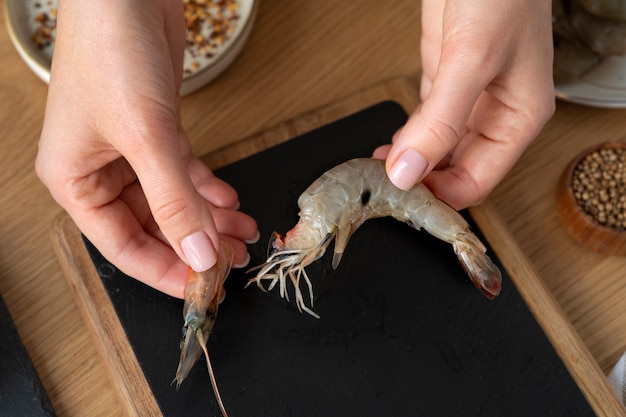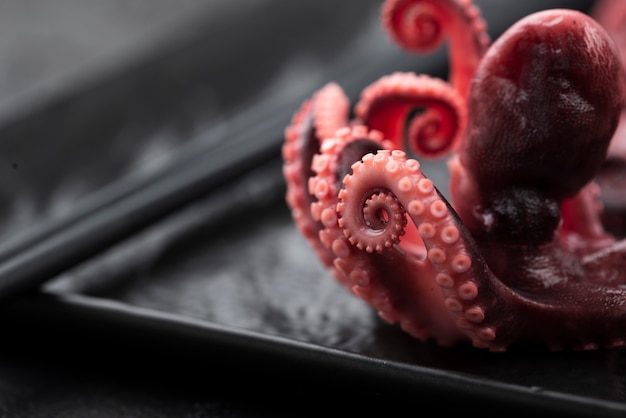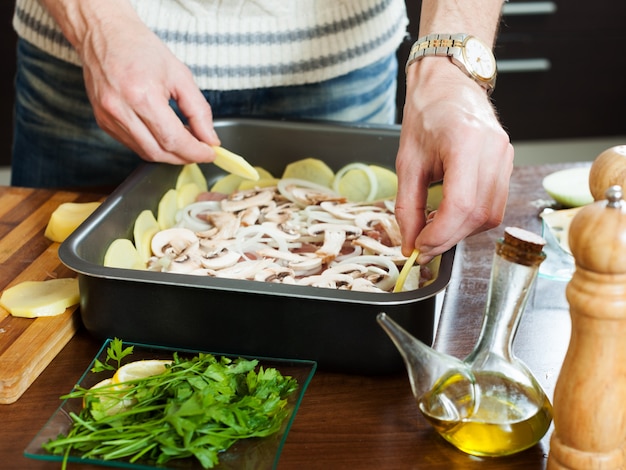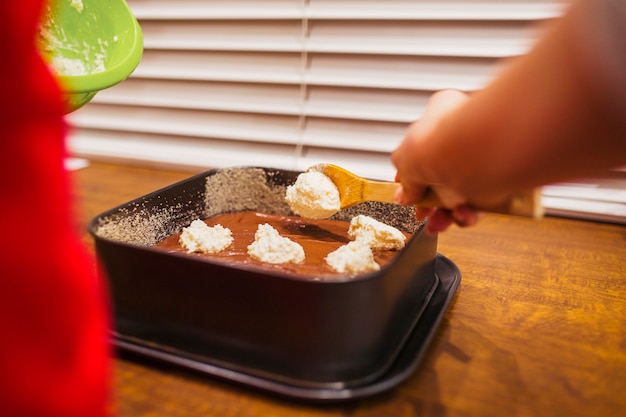From the Depths to Your Kitchen

The journey of octopus begins with choosing the right one. I’m no seafood expert, but I’ve learned that freshness is paramount. Look for octopus with a vibrant colour, firm flesh, and a fresh, briny scent. Your local fishmonger is a great source, or you can find it frozen in supermarkets. If you’re lucky enough to live near a coast, consider getting it straight from a fisherman – nothing beats the taste of fresh, local produce. My friend in Cornwall always sends me pictures of his latest catch, making me a tad envious, I must admit!
Preparing the Octopus: A Gentle Touch
Once you’ve got your octopus, it’s time to give it a good clean. Don’t be intimidated, it’s really not complicated. First, rinse it thoroughly under cold running water, removing any sand or debris. Next, you’ll need to remove the beak – that hard, pointy bit in the centre of the head. You can use a sharp knife, but I find a pair of kitchen shears easier.
Now, here’s where things get interesting – skinning. Some recipes suggest removing all the skin, but I prefer to leave some on for a bit of extra texture. Blanch the octopus for a few minutes, then gently peel the skin off with your fingers. It’s like peeling a potato, but with tentacles!
Part 2: Tenderizing the Beast

The Key to Tenderness: Time and Temperature
Now, let’s address the elephant in the room – tenderizing. Uncooked octopus can be quite tough, so getting this right is crucial. The secret? Time and temperature. Here are a few methods to help you achieve that melt-in-your-mouth texture:
- Poaching: The Gentle Approach This is my personal favourite. Simmer the octopus in salted water for about an hour, until it’s tender. It’s a simple yet effective way to bring out the octopus’s natural flavour.
- Braising: Adding Depth and Complexity Braise the octopus in a flavorful broth like wine or tomato sauce. This adds another layer of flavour complexity.
- Pressure Cooking: The Quick Fix This method delivers results faster, but can sometimes make the octopus a bit rubbery. If you choose this route, keep a close eye on it!
When poaching or braising, remember to keep the water simmering, not boiling. This prevents the octopus from becoming tough and ensures a tender outcome. Gentle cooking is key.
Testing for Tenderness: The Bend Test
How do you know when your octopus is cooked? Here’s a simple trick I use: Take a tentacle and bend it. If it bends easily without breaking, it’s cooked to perfection.
Part 3: Flavour Fusion: A Symphony of Taste

Now that your octopus is tender and ready to go, it’s time to get creative with the flavour. This is where the real fun begins! There are endless possibilities for cooking octopus, each revealing a different facet of its flavour.
Inspiration from Around the Globe
Here are a few ideas to get your culinary imagination flowing:
- Mediterranean Delight: Imagine olive oil, garlic, lemon, and fragrant herbs like oregano and basil. A simple yet classic combination that works wonders.
- Spicy and Bold: Add a touch of heat with chilli flakes, paprika, or a pinch of cayenne pepper. Smoked paprika adds a deeper, smokier flavour.
- Asian Fusion: Stir-fry your octopus with ginger, garlic, soy sauce, and sesame oil. Chillies, coriander, or rice wine vinegar add an authentic touch.
Don’t be afraid to experiment and discover what you like best. That’s the beauty of cooking, isn’t it? You can take a simple ingredient like octopus and transform it into something extraordinary.
Part 4: Octopus in Action: Recipes to Impress
Now, let’s get practical. Here are a few of my favourite octopus recipes that I’ve perfected over time. They’re simple, delicious, and guaranteed to impress your guests.
Octopus Salad: A Fresh and Vibrant Delight
This is a classic recipe that’s always a crowd-pleaser. Chop your tender octopus into bite-sized pieces and toss it with olive oil, lemon juice, red onion, and fresh herbs. Add capers and black olives for an extra burst of flavour. Serve it cold or at room temperature with crusty bread for dipping.
Grilled Octopus: Smoky and Charred Perfection
For a more substantial dish, try grilling your octopus. Season it with salt, pepper, and a sprinkle of paprika, then grill over medium heat for a few minutes per side, until nicely charred. Serve it with a drizzle of olive oil, a squeeze of lemon, and fresh parsley.
Octopus Stew: A Hearty and Comforting Meal
For a comforting and warming meal, try an octopus stew. It’s a great way to use up leftover octopus. Simply simmer it in a rich tomato broth with potatoes, onions, carrots, and spices like cumin and coriander. Serve it with crusty bread for a satisfying meal.
Part 5: FAQs: Unveiling the Mysteries
Now, I know you might have some questions about octopus, so here are some of the most frequently asked questions I get:
1. Is Octopus Safe to Eat?
Yes, octopus is safe to eat, as long as it's been cooked properly. The key is to make sure it's cooked through to the centre, to kill any bacteria. When in doubt, cook it a little longer.
2. What Does Octopus Taste Like?
It’s hard to describe the taste of octopus. It’s not as strong as shellfish, but it has a distinct, slightly briny flavour. The texture is similar to squid, but a bit firmer.
3. How Long Can I Store Octopus?
Fresh octopus should be stored in the refrigerator for up to 2 days, wrapped tightly in plastic wrap. Frozen octopus can last for up to 3 months in the freezer.
4. Is Octopus Expensive?
The price of octopus can vary depending on where you buy it. It’s usually cheaper to buy frozen octopus, but fresh octopus is always worth the extra cost.
5. What's the Best Way to Cook Octopus?
There’s no one “best” way to cook octopus, as it really depends on your preferences. However, poaching or braising are great methods for tenderizing the octopus and bringing out its natural flavours.
Part 6: A culinary adventure: Embracing the Unknown
So there you have it – your ultimate guide to cooking octopus. It might seem a bit daunting at first, but trust me, it’s really not that difficult. Once you get the hang of it, you’ll be amazed at how versatile and delicious this ingredient can be.
I encourage you to get out there and experiment. Try different recipes, different flavours, and different cooking methods. You might just discover your new favourite dish!
Part 7: A Personal Touch: Memories Made in the Kitchen
You know, a particular memory comes to mind when I think about octopus. It was a warm summer evening, and I was on holiday in Greece. We were sitting at a small taverna by the sea, enjoying a delicious meal of grilled octopus with lemon and oregano. The air was filled with the scent of the sea and the sound of laughter, and I remember feeling so content and happy. That’s what cooking is all about, isn’t it? It’s about sharing food with loved ones and creating memories that last a lifetime.
Part 8: Beyond the Plate: Sustainability and Responsibility
Now, I know this article has been all about cooking octopus, but I’d be remiss if I didn’t mention the importance of sustainable fishing. Octopus is a valuable resource, and we need to make sure we’re using it responsibly. When you’re buying octopus, always look for sustainable seafood labels, and try to support local fishermen. They’re the ones who know how to fish sustainably and protect our oceans for future generations.
Part 9: Final Thoughts: A culinary journey Awaits
So, there you have it. From the depths of the sea to your plate, from tender to delicious, I hope this guide has inspired you to try cooking octopus. It’s an ingredient that’s full of flavour, texture, and possibilities. So go on, get adventurous, and let your culinary journey begin!
Everyone is watching

How to Cook Frozen Lobster Tails Perfectly: A Step-by-Step Guide
RecipesLobster. Just the word conjures up images of lavish meals, special occasions, and a taste of luxury. But let's...

Pork Fillet Cooking Time: How Long to Cook It Perfectly
RecipesPork fillet, or tenderloin as it's sometimes called, is a real favourite in our house. It's so versatile, and...

Pigs in a Blanket Cooking Time: How Long to Bake for Perfect Results
RecipesAh, pigs in a blanket. Just the name conjures up images of those delightful little parcels of crispy pastry en...

The Ultimate Guide to Cooking Delicious Frankfurters
RecipesLet's face it, we all love a good frankfurter. It's a classic, simple, and always satisfying. But let's be rea...

Wolf Meat Recipes: A Guide to Cooking Wild Game
RecipesLet's be honest, you don't see wolf meat at your local butcher shop every day. It's a bit of a wild card, but ...
